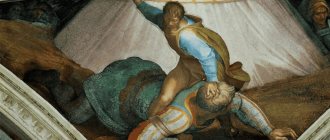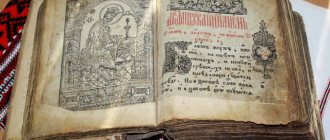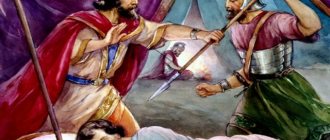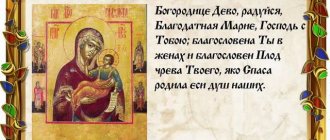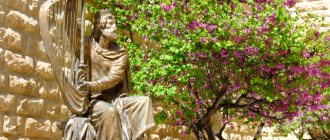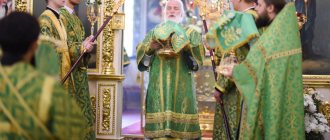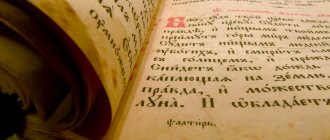Text of prayer Psalm 100
In Church Slavonic with accents
Psalm to David
1 I will sing to You of mercy and judgment, O Lord.
2 I will sing and understand in the way without blame, when you come to me. I walked in the gentleness of my heart in the midst of my house.
3 I did not put before my eyes a thing that was unlawful; I hated those who committed crimes.
4 My heart does not cling to the obstinate one; I have not known the evil one who turns away from me.
5 Whoever slandereth his sincere one, I cast him out: with a proud eye and an unsatisfied heart, I do not eat with this.
6 My eyes are on the faithful lands, plant them with me: walk in the path blameless, this one will serve me.
7 If you do not live in the midst of my house, you will not create pride, as you say unrighteously, and you will not be right in my sight.
8 In the morning they slaughtered all the sinners of the earth, even as all the workers of iniquity consumed from the city of the Lord.
In Russian
Psalm of David
1 I will sing mercy and judgment; To you, Lord, I will sing.
2 I will meditate on the blameless way: “When will you come to me?” I will walk in integrity of my heart in the midst of my house.
3 I will not place in my sight any obscene thing; I hate criminal deeds: they will not stick to me.
4 A corrupt heart will be removed from me; I will not know evil.
5 He who secretly slanderes his neighbor I will drive out; I will not tolerate someone who is proud in his eyes and arrogant in his heart.
6 My eyes are on the faithful of the earth, that they may remain with me; He who walks in the way of integrity will serve me.
7 No one who acts deceitfully will live in my house; he who speaks a lie will not remain before my eyes.
8 From early in the morning I will destroy all the wicked of the earth, to destroy from the city of the Lord all the workers of iniquity.
Interpretation of the Orthodox prayer Psalm 100
no comments
According to the assumptions of researchers, the text of Psalm 100 belongs to the authorship of King David, and it was written on the occasion of the transfer of the Icon of the Covenant to Jerusalem. It is known from the Bible that this solemn procession was overshadowed by a sad incident: the ark fell from the cart pulled by oxen, and the Levite Uzzah, who ran to pick it up, fell dead at the same moment.
Therefore, Orthodox Psalm 100 is filled with sadness: David’s grief at the loss of a faithful subject is mixed with the bitterness of awareness of human unworthiness in comparison with the holiness and perfection of God and everything He touches.
In what cases is it customary to read Psalm 100?
After the death of Uzzah, the procession was suspended, and the Icon of the Covenant was brought to the house of Abeddar, where it remained for three months. The interpretation of Psalm 100 suggests that all this time David was pondering the question that worried him and was lamenting, perceiving the death of his comrade as a manifestation of God’s displeasure. In the text of the psalm, he promises God to protect himself from all sin and lawlessness, not to communicate with unworthy people, and to carry out fair justice. Read and listen online to Psalm 100 about pious people, so that God will grant them grace.
Listen to the video of the Orthodox prayer Psalm 100 in Russian
Read the church text of the prayer Psalm 100 in Russian
I will sing mercy and judgment; To you, Lord, I will sing. I will reflect on the blameless path: “When will you come to me?” I will walk in integrity of my heart in the midst of my house. I will not place indecent things before my eyes; I hate criminal deeds: they will not stick to me. A corrupt heart will be removed from me; I will not know evil. He who secretly slanderes his neighbor I will drive out; I will not tolerate someone who is proud in his eyes and arrogant in his heart. My eyes are on the faithful of the earth, so that they may remain with me; He who walks in the way of integrity will serve me. No one who acts deceitfully will live in my house; he who speaks a lie will not remain before my eyes. From early morning I will destroy all the wicked of the earth, in order to uproot from the city of the Lord all the workers of iniquity.
Orthodox Psalter, text of Psalm 100 in Church Slavonic language
I will sing to you of mercy and judgment, O Lord; I sing and understand on the way blameless; when will you come to me? walking in the gentleness of my heart in the midst of my house. Do not offer before my eyes a thing that is unlawful; the perpetrators of the crime are hated. Do not cling to my obstinate heart; I have not known the evil one who turns away from me. The one who slanderes his sincere secret, I expel him; with a proud eye and an insatiable heart, I don’t eat with this. My eyes are on the faithful lands, plant them with me; Walk on the path blameless, serving these people. Do not live in the midst of my house and create pride; Say, the unrighteous is not right before my eyes. In the morning we slaughtered all the sinners of the earth, even if they consumed all the workers of iniquity from the city of the Lord.
History of Psalm 100 and its interpretation
Authorship is attributed to the king and prophet David. The text of Psalm 100 was written not only as a consequence of the sudden death of King David's servant. This song also has its own deep meaning, which is easier to understand by analyzing the interpretation of Psalm 100 verse by verse:
- The first line of the psalm is prophetic. David says that God combines mercy and judgment - such seemingly contradictory concepts to the ordinary human eye. On the one hand, the Lord is all-merciful, but on the other, He is the righteous Judge of not only deeds, but also words, and even thoughts.
- Verse 2-3. If the Lord is the Judge, then I “will meditate on the blameless path,” says the prophet, I will seek how to act well before the Lord, I will purify my thoughts and feelings. King David also advises not to allow unclean, selfish thoughts and to act piously. But one should abstain not only from unrighteous actions, thoughts and feelings, but also from people who act deceitfully.
- In verse 4, the author advises not to pay attention to false suggestions, try not to think about them, and not to take such “pretexts” to heart and mind. “I have not known the evil one who turns away from Me (that is, from the Lord),” that is, on his way the prophet did not recognize and accept the false, evil intentions of people who depart from God. The psalm also advises young and old “those in power” to listen to good advice and beware of criminal people in order to keep lies away from themselves.
- Verse 5 is a prophetic testament to move away from people who spread false accusations and gossip, since such a person can tell lies both about the king himself and about his neighbor.
- In verses 6-7, David confirms that “planting,” that is, doing good, creative deeds, must be done with those who are faithful to God, worthy people with pure thoughts. And proud and deceitful people can harm God's work.
- The words “In the morning I beat all the sinners of the earth” should not be taken literally. “Earth” here is the heart, and “wicked”, which must be “killed” in the morning, are evil thoughts that we do not want to have, but they themselves appear in the heart, like weeds from the ground. They must be killed without pity, and from an early age, so that they do not take root and conquer “in the city of the Lord,” that is, in the holy soul.
Psalm 100
In the psalm, David paints an image of his future reign, the ideal of his reign, depicting a painfully yearning mood, waiting for “when will You, Lord, come to me?” (Ps. 100:2) The content of the psalm is consistent with the circumstances of David’s transfer of the Icon of the Covenant to Jerusalem. It is known that the death of Uzzah, who touched the Ark without due reverence, saddened David, who did not dare to carry it further. The ark was placed in the house of Abeddar. In the death of Uzzah, David saw an indication that he was not worthy of God’s mercy, that the Lord could not come to Jerusalem now, probably because of some kind of moral impurity in the latter. Therefore, David in the psalm vows before God to take care of the cleansing of Jerusalem in order to make it a place worthy for the most holy Being to dwell in it.
Ps.100:1. I will sing mercy and judgment; To you, Lord, I will sing.
David promises to sing of Divine mercies, His judgment, that is, the truth that is given in His law. Since the entire content of the psalm represents the disclosure of the general foundations of David’s future transformative activity, the expression “mercy and judgment” will mean: I, Lord, will take care of the purification and elevation of the inner, moral side (“mercy”) of the life of Jerusalem, as well as enlightenment people in the commandments of the law and about the coordination of their lives with the instructions of Your will. In a less logical, but not contradictory connection with the entire content of the psalm, there will be such an understanding: I will acquaint and teach the people in their affection for You by revealing to them those numerous benefits (“mercy”) that You poured out on them throughout their entire life, in order to thereby dispose him to follow Your commandments (“I will sing judgment”).
Ps.100:2. I will reflect on the blameless path: “When will you come to me?” I will walk in integrity of my heart in the midst of my house.
“I will meditate on the blameless way” - I will take care to make my actions pure in order to know when I will be worthy to receive the Ark of the Covenant (“when will you come to me?”). I will take care (past tenses instead of future ones) about the blameless path, not only in the sense of vigilance in relation to my thoughts and feelings, but also in relation to my actions as a private person and as a ruler of the people.
Ps.100:3. I will not place indecent things before my eyes; I hate criminal deeds: they will not stick to me.
I will hate everything criminal (“I will not put it before my eyes” - I will not admire or imitate), as well as criminal people.
Ps.100:4. A corrupt heart will be removed from me; I will not know evil.
Ps.100:5. He who secretly slanderes his neighbor I will drive out; I will not tolerate someone who is proud in his eyes and arrogant in his heart.
“A corrupt heart will be put away from me”—a proud heart will not be in me; there will be no actions prompted by personal, wayward desire; on the contrary, I will humbly be guided by the instructions of Your will; I will cleanse the city from slanderers and not enter into close relations with people who despise others and are insatiably ambitious, i.e. David promises to elevate and bring closer to himself only those who are worthy.
Ps.100:6. My eyes are on the faithful of the earth, so that they may remain with me; He who walks in the way of integrity will serve me.
Ps.100:7. No one who acts deceitfully will live in my house; he who speaks a lie will not remain before my eyes.
Ps.100:8. From early morning I will destroy all the wicked of the earth, in order to uproot from the city of the Lord all the workers of iniquity.
All David's favor will be to those who believe in God, are pious (“faithful of the land”), and pure in deeds (“who walk in the way of integrity”). - “He who speaks a lie will not remain before my eyes” - he will not be right, he will not be encouraged and rewarded by me. - “From early morning” - with possible and complete speed (“morning”) and steadfastness I will take care of cleansing the city of all lawless people.
The psalms of the 1st hour end with this prayer of David. Here, in addition to Psalms 5 and 8, the Church offers general instructions for man to guide his activities in the coming day.
When and why is Psalm 100 read?
Psalm 100 is read at the end of the first hour at the evening service (or at the all-night vigil). Although the text was written by King David in sorrowful circumstances, it is also read in other times:
- about pious people, so that the Lord grants them grace and help;
- to one who, following the example of King David, decided to get rid of long-standing sin.
- whoever grieves will find consolation and hope and understand the mercy of God;
- For pious owners, reading the psalm will help protect their home and loved ones from evil people.
